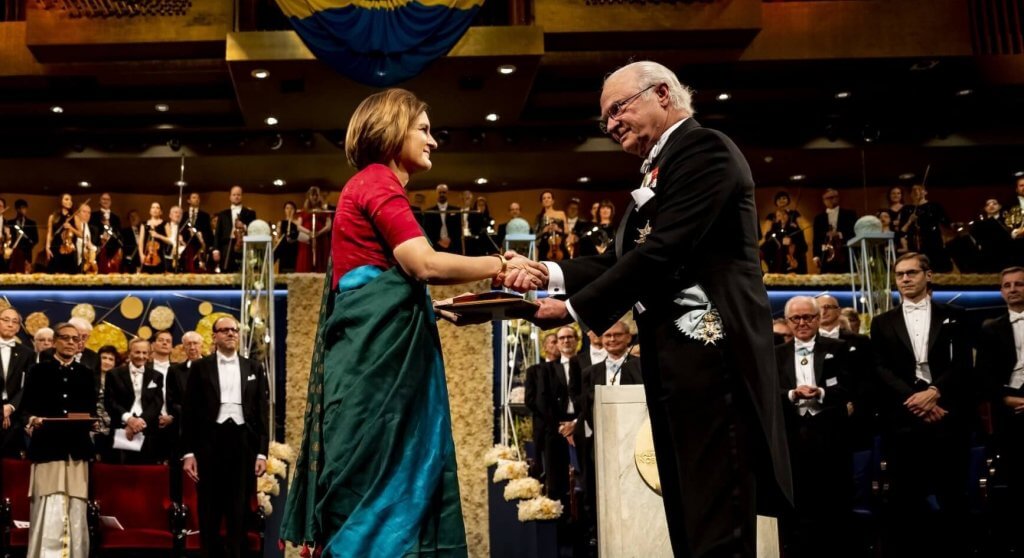2019 Nobel Prize Recipient, Abhijit Banerjee, Reflects on Leadership in the Social Sector
Last week I had the good fortune to sit down for lunch with MIT economist Abhijit Banerjee — one of the three winners of the 2019 Nobel Memorial Prize in Economic Sciences — just hours before he was to board a flight to Sweden. Upon arrival in Stockholm, Banerjee would meet up with his co-recipients, Esther Duflo (MIT) and Michael Kremer (Harvard), to accept the award for, in the words of the Nobel Prize committee, “their experimental approach to alleviating global poverty” which “in just two decades…has transformed development economics,” “helped to alleviate global poverty” and demonstrated “great potential to further improve the lives of the worst-off people around the world.”
If it is no everyday experience to have lunch with a Nobel Laureate en route to accept his prize, it is equally unusual for the recipient(s) of the Nobel Prize in Economics to be economists who also have extensive experience leading and managing a social sector organization. And it is downright remarkable that J-PAL, the social sector organization in which Banerjee, Duflo and Kremer have played leadership roles, is by almost every measure extraordinary. Founded in 2003, J-PAL excels at identifying effective interventions and then working with both governments and NGOs to carry them out. It has pushed randomized control trials (RCTs) to the forefront of evaluation and encouraged the acceptance of RCT results in the global economic-policy community.
Indeed, J-PAL’s website has a searchable link to 986 randomized evaluations conducted by its affiliates in 83 countries. These evaluations have exponentially increased the impact of the social sector organizations and governments that use them because they enable leaders and policymakers to understand if an intervention really works — or doesn’t — and to then adjust their programs accordingly. Prior to the widespread use of RCTs, we were all essentially “flying blind,” fueled by hope that we were on the right path, but without any data to confirm or course correct. The 2019 Nobel Laureates have made a profound and enduring contribution by propelling a movement that equips those who work to solve social problems to make data-driven decisions.
Banerjee and I discussed the exciting and profound implications of the work of the 2019 recipients for the social sector; such challenges as the high price of RCTs; and potential solutions to these challenges, including what he views with great enthusiasm as “the next frontier.” He offered his reflections on managing people: lessons he has learned about how to form good working relationships and foster best-in-class teams in order to build an organization of the caliber required to create enduring impact. And, Banerjee shared that two personal sources of inspiration in the social sector were leaders of Pratham and the Liver Foundation who work tirelessly on the ground every day to make an enduring impact on those in extreme poverty in India.
Abhijit Banerjee, Esther Duflo and Michael Kremer at the Nobel Prize award ceremony, Konserthuset Stockholm on 10 December 2019
Photo: Nanaka Adachi/Nobel Media
J-PAL equips policymakers and social sector leaders to “get their goggles”
When traveling in Italy last summer, I happened upon street art by “Blub” that featured famous figures underwater wearing goggles. An Italian friend, Ilaria Maria Placco, explained that there is an expression in Italian of “being underwater” when things are overwhelming, and Blub’s guidance to “get your goggles” in such times was a source of inspiration. This resonated with me, since I view the social sector as a place where the water often feels deep and murky, and I aspire to use my new column to provide the “goggles” that will help us all navigate our sector more clearly. My ability to do this, however, is in large part predicated on the profound contribution that Banerjee, Duflo and Kremer have made to the field of development economics. Indeed, they have effectively encouraged the entire social sector to “grab their goggles” through their pioneering use of randomized evaluations that enable us to see more clearly what works and what doesn’t.
The Swedish Academy of Sciences, in its backgrounder on the prize, praised Banerjee, Duflo and Kremer for demonstrating how the problem of global poverty can be addressed by breaking it into smaller, more precise questions at the individual or group levels and answering each by using a specially designed field experiment. “Over just twenty years,” it explained, “this approach has completely reshaped research in the field known as development economics. This new research is now delivering a steady flow of concrete results, helping to alleviate the problems of global poverty.” As Banerjee himself explained over lunch:
There has been a sea change relative to what I remember two or three decades ago. Before, there were all kinds of general principles articulated…but the discussions went around and around and around. In fact, I was in the room during many of those conversations! There was no clear path regarding what should be done and how to do it. Today, that has all changed. We now have a good sense of what works and how to implement. These are very exciting times!
Challenges and “the next frontier”
Randomized evaluations are not without their critics. One of the most pervasive complaints is their cost, which is often high (in part because researchers typically have to collect the primary data from scratch) and can be prohibitive for some organizations. Indeed, J-PAL acknowledges that an RCT may not be appropriate if it “is too time-consuming or costly and therefore not cost-effective.” But, apart from those few cases where an intervention is simply not suited to an RCT, they remain the gold standard. As Duflo once told the New Yorker, an RCT “takes the guesswork, the wizardry, the technical prowess, the intuition, out of finding out whether something makes a difference.”
That said, J-PAL has a “New Ideas Initiative” that aims to leverage already existing administrative (admin) data for social impact. In the past five years, firms, governments and nonprofits worldwide have vastly expanded the digital collection and storage of administrative data. But even though ever more digital data is being stored and collected, the vast majority of it is not yet being analyzed and used, in partnership with researchers, to its full potential. This creates tremendous opportunities to improve social programs and policies based on evidence and data. “This is what I’m most excited about right now,” said Banerjee, “it is the new frontier! We can move toward using more administrative data in governments so that we can do quick RCTs that are less costly because you don’t have to collect the data. We can increase data-driven decisions by accessing and analyzing admin data and evaluate solutions quicker, cheaper, and more accurately.”
Nobel laureates in economics Abhijit Banerjee and Esther Duflo pose after signing chairs at the Nobel Museum in Stockholm, Sweden on December 6, 2019
Photo: Clément Morin/Nobel Media
Reflections on creating the best working relationships
Building the organization of J-PAL over the past 16 years has required vision, tenacity and perhaps most importantly, a team of exceptional people functioning at a very high level. J-PAL currently has a core staff of more than 400 trained professionals, a network of nearly 200 affiliate professors across the globe, and six regional offices hosted by universities in Africa, Europe, Latin America & the Caribbean, North America, South Asia and Southeast Asia. When I asked Banerjee what he has learned over the years about managing people and leading an organization, he replied, “There are only a few things I’m good at with respect to working relationships: I’m good at spotting top talent, I trust my judgment on people, and I go long on individuals. These few things make all the difference.” He continued:
My main insight about building an organization is that you have to find the very best people — top talent — and then you have to trust them. Trust them. That means you have to give them an enormous amount of respect and indulgence. And because it is top talent and you trust them, they can have as much of your time as they want and need. And what you will get back is so much productivity! You simply cannot double guess your team. If people on your team aren’t excellent, then you have to double guess them — which is a big waste of everyone’s precious time.
Sources of personal inspiration: leaders from Pratham and the Liver Foundation
When I asked Banerjee about nonprofits that he holds in high regard, and those leaders that give him great personal inspiration, he was quick to herald Pratham and the Liver Foundation. Pratham was one of the earliest nonprofits to conduct RCTs with J-PAL and Banerjee has thus worked with its leaders, Drs. Madhav Chavan and Rukmini Banerji, for over a decade. (Pratham has completed more than 12 RCTs with J-PAL over more than 15 years). Banerjee commented, “Pratham’s impact on the lives of millions of kids has been tremendous; it is quite simply an exceptional, best-in-class organization that has managed to scale across India.”
Banerjee also commended the leader of the Bengal-based Liver Foundation, Dr. Abhijit Chowdhury, as a personal source of inspiration. The Liver Foundation works for the improvement of rural healthcare in part through the training of informal medical practitioners, or IMPs, and approached Banerjee back in 2010 because they wanted to know if their efforts were making a positive impact. Banerjee’s analysis paved the way for enhanced and more regular training programs for informal healthcare providers, which has improved outcomes for patients. Through the course of this work, Banerjee came to appreciate and be inspired by Chowdhury’s leadership. “Chowdhury is someone who works tirelessly to make a real difference in the lives of those in poverty. He does so many things and accomplishes so much good every day. A modern-day hero.”
Banner photo courtesy of Nanaka Adachi/Nobel Media
Originally published in Forbes

